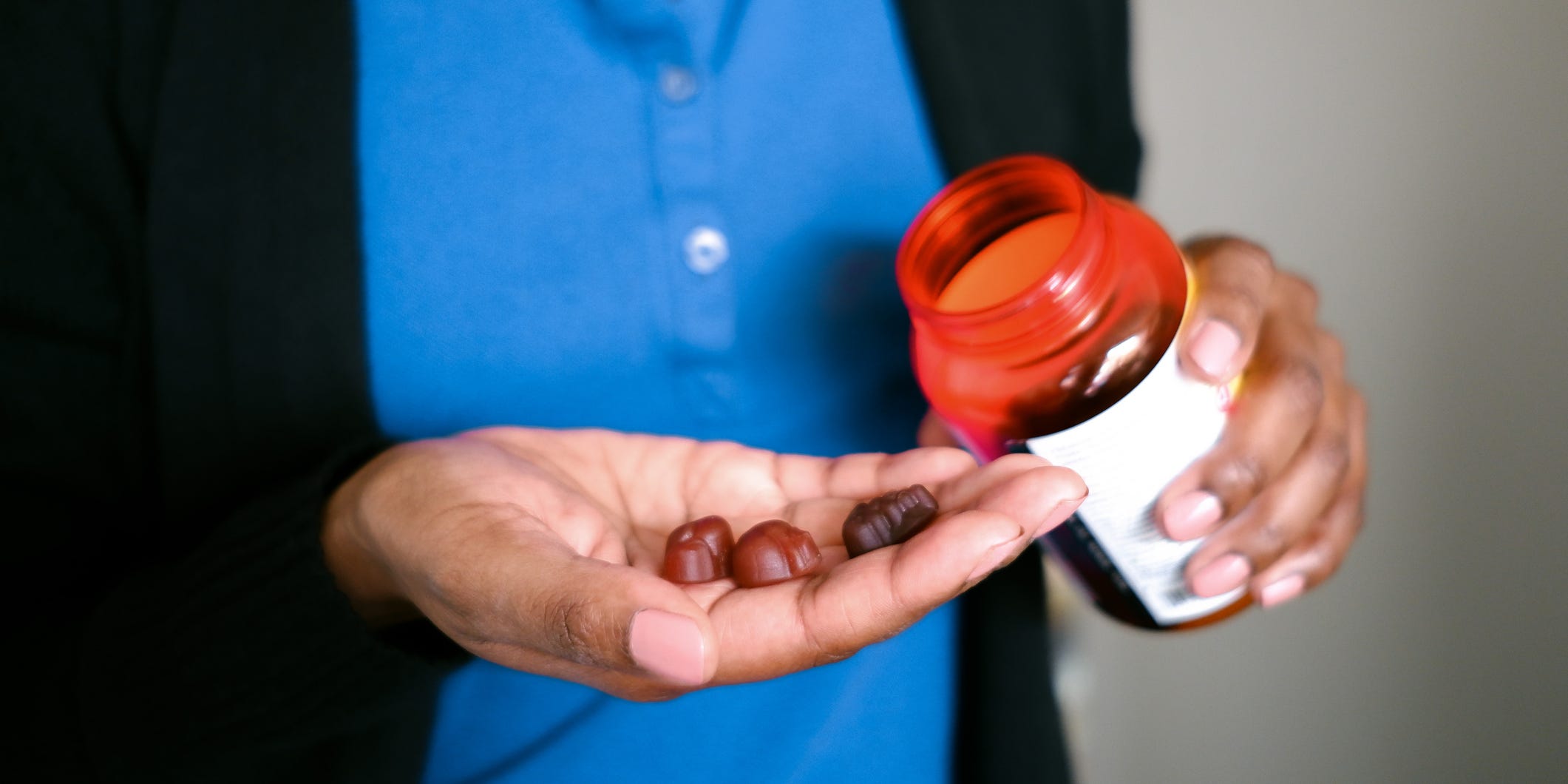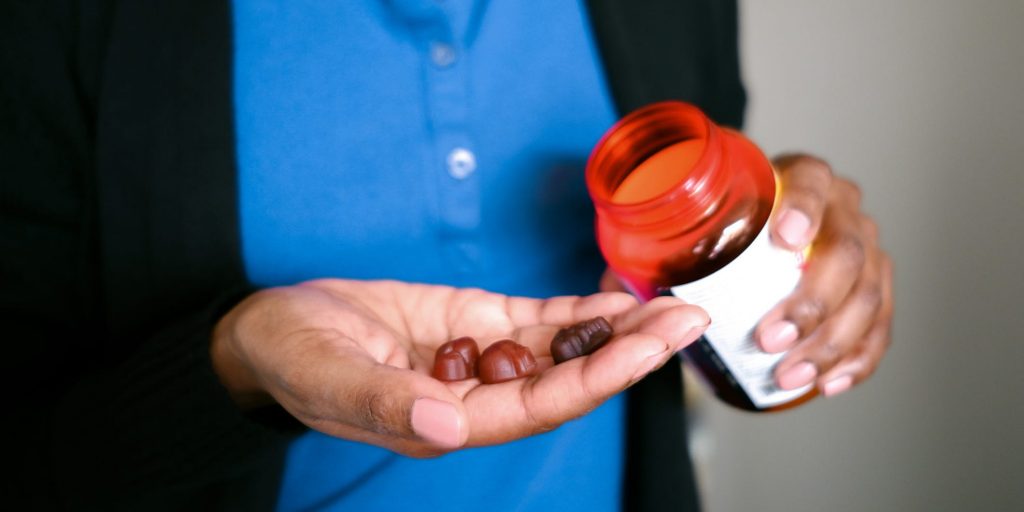
- People taking a magnesium supplement are at risk of getting too much magnesium.
- Side effects of too much magnesium include cramping, nausea, depression, and low blood pressure.
- If you're experiencing signs of magnesium toxicity, it's important to contact your doctor immediately.
- Visit Insider's Health Reference library for more advice.
Magnesium is a mineral that supports lots of processes in the body including nerve function, blood sugar control, building protein, and blood pressure control.
It's found in foods including seeds, nuts, green vegetables, and whole grains. But many people may also take magnesium supplements to regulate bowel movements or aid muscle recovery.
"It is rare to obtain too much magnesium from food products, but is more likely to happen when taking supplements," says Neal Patel, MD, family medicine physician with Providence St. Joseph Hospital.
Medications that contain magnesium, including antacids, laxatives, and magnesium sulfate used to prevent seizures in pregnant women with preeclampsia can also lead to too much magnesium in the blood.
Certain groups including people with kidney disease are at higher risk for getting too much magnesium. Here's how to spot the signs of too much magnesium and get the help you need.
How much is too much
Adult males need 400-420 milligrams (mg) of magnesium each day from both food and supplemental sources, while females need 310-320 mg/day. About 48% of Americans don't get enough magnesium from their diets, so supplementing is common.
When taking supplements, you should never consume more than the Tolerable Upper Intake Level for magnesium, which is 350 mg each day for people who are 9 or older. If you take more than that amount, you might start noticing symptoms.
Magnesium supplements vary in how much magnesium they contain. A multivitamin might contain 100 mg of magnesium, while magnesium-specific supplements often contain 200 mg or more.
Side effects
If you're getting too much magnesium, the first symptoms that you'll notice are nausea, diarrhea, and cramping.
Magnesium toxicity is diagnosed when the concentration of magnesium in your blood reaches 1.74–2.61 millimoles per liter (mmol/L). When that happens you may notice additional symptoms including:
- Muscle weakness
- Low blood pressure
- Flushing in the face
- Retaining fluid
- Lethargy
- Depression
- Confusion
Severe magnesium toxicity can cause trouble breathing, a rapid heartbeat, and cardiac arrest. In very rare cases, people who take too much magnesium can develop fatal hypermagnesemia, an electrolyte disorder that is most common in people with kidney failure.
It's possible for the symptoms of too much magnesium to build over time, especially when you're taking supplements that have a high dose, says Patel.
Treatment
Anytime you're experiencing symptoms of magnesium toxicity, it's a good idea to reach out for medical help, especially if you're taking a supplement containing magnesium.
The first treatment for too much magnesium is to stop taking any supplements or medications that contain magnesium. Within 28 hours of stopping medication or supplements, magnesium levels should be about half of what they were for the average adult, and you'll likely start feeling better.
However, that time frame largely depends on kidney function since "magnesium is usually cleared out of the system effectively by the kidneys," says Patel.
If your levels are particularly high or if you have kidney problems, your doctor might give you an intravenous diuretic, which will help you produce more urine and clear magnesium more quickly.
If you have severe symptoms including low blood pressure or loss of muscle function, doctors might prescribe calcium gluconate or chloride. These medications can neutralize magnesium in the body so that it's no longer impacting your nerve and muscle function.
Treatment is more complicated for people with kidney disease, since their kidneys may be less able to process magnesium. In some very severe cases, a patient may need dialysis to clear magnesium from their blood. Dialysis can reduce the amount of magnesium in the blood by half within four hours.
Risk factors and interactions
For the average healthy adult taking a magnesium supplement, the risk for toxicity is low. People who are most at risk usually either have an underlying condition that affects kidney function or are taking medications or supplements with a very high dose.
- People who have kidney failure are at increased risk for magnesium toxicity because their kidneys don't clear excess magnesium from the blood in the same way healthy kidneys do. The more impaired your kidney function, the higher your risk for magnesium toxicity.
- Cancer patients are also at risk for high magnesium levels because of treatments like chemotherapy that can lower their blood cell count. When red blood cells burst, a process called cellular hemolysis, they can spill magnesium into the body.
- Pregnant people being treated for pre-eclampsia are at increased risk because high doses of magnesium are used to prevent seizures in these patients. Magnesium is typically given short-term for these patients, often for less than 24 hours. The FDA has warned against using it for longer than 5-7 days. Your doctor will monitor you for signs of magnesium toxicity during your treatment.
Although taking a magnesium supplement can seem harmless, the supplements can interact with a number of different drugs that contain magnesium and increase your risk for toxicity. Drugs that interact with magnesium supplements include:
- Bisphosphonates, used to treat osteoporosis
- Some antibiotics, including demeclocycline (Declomycin®) and doxycycline (Vibramycin®)
- Diuretics
- Some proton pump inhibitor (PPI) drugs, used to reduce stomach acid
Insider's takeaway
To increase your magnesium intake, focus on eating foods that contain magnesium, including chia seeds, spinach, and black beans, says Patel.
"If it still poses a challenge, a magnesium supplement may be helpful, and the possibility of overdosing is very low," he says.
Speak with your doctor before starting a supplement if you have any medical issues or are on any other over-the-counter or prescription medications or supplements.
"You should always disclose and discuss your supplements with your doctor," says Vandenberg. "Many can have interactions with medications or lead to toxicity."
